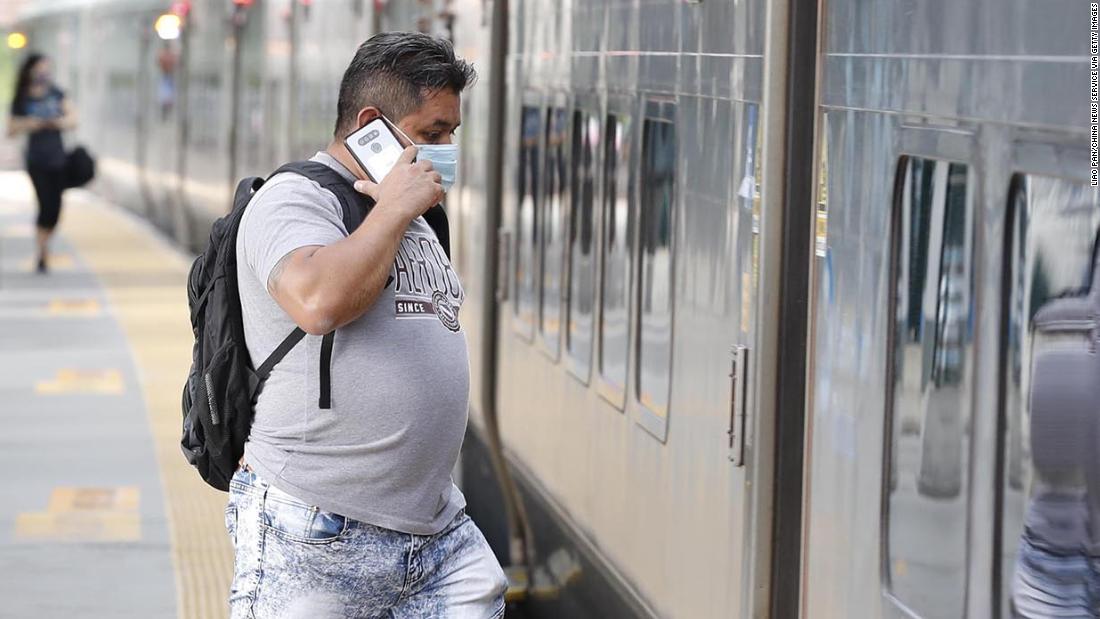
The idea of a second wave is based on the pattern seen during the 1918 pandemic, when cases were seen in the spring and then cases "literally disappeared" before there was an "explosion" of cases in the fall, Fauci said.
"Rather than say, 'A second wave,' why don't we say, 'Are we prepared for the challenge of the fall and the winter?'" Fauci said.
That challenge could include surges of Covid-19 cases across the country as more fronts open up, including the many schools and colleges nationwide that have welcomed students back to class. And as the weather gets cooler, more gatherings will move inside, where the virus can spread more easily.
There's also a potentially complicated flu season on its way that could pile on top of the pandemic and quickly overwhelm the healthcare system. The US Centers for Disease Control and Prevention director has warned it could be a historically difficult fall and winter.
Across the US, more than 6.9 million people have already been infected with the virus. CDC Director Dr. Robert Redfield said this week more than 90% of the population remains susceptible to the virus. At least 202,000 Americans have died.
As of early Friday morning, 23 states across the country's heartland and Midwest reported an increase of new cases compared to the previous week, according to data from Johns Hopkins University. About 16 states were trekking steady. Eleven states saw a decline -- Arizona, Connecticut, Delaware, Hawaii, Indiana, Maryland, Ohio, Pennsylvania, South Carolina, Vermont and Virginia.
How to prepare
Cities, counties and states that have managed to bring their Covid-19 cases down should now work to prevent "surges that inevitably will occur if you're not doing the kinds of public health measures that we're talking about," according to Fauci.
Those measures include what experts have for months vouched for: face coverings, hand-washing and avoiding crowds.
About 12 states are now seeing mask usage rates above 50%, according to researchers from the University of Washington's Institute for Health Metrics and Evaluation (IHME). Those include California, Colorado, Florida, Maryland, Mississippi, New Jersey, North Carolina, Pennsylvania, Texas, Virginia, Washington and West Virginia.
The IHME projects if 95% of Americans wore masks, more than 95,000 lives could be saved by January.
And there's another tool that could make the next months easier: the flu shot. The US has ordered about 200 million doses of that vaccine, Fauci said, the highest amount officials have ever tried to vaccinate. Public health officials say fewer people battling the flu this year will lessen that burden on healthcare professionals that are also trying to treat Covid-19 patients.
"If we listen to the public health measures, not only would we diminish the effect of Covid-19, we might get away with a very, very light flu season if we combine that with getting the flu vaccine," Fauci said.
Skepticism of Covid-19 vaccine an 'enormous' problem
While vaccines for Covid-19 are being tested, the growing skepticism around them is becoming an "enormous" problem, according to Dr. William Schaffner, a professor of infectious diseases at Vanderbilt University Medical Center.
It's a problem, Schaffner says, "because once we do develop a vaccine, obviously we want people to accept it, but there's growing skepticism ... in the general population."
US health experts have previously said it's likely many Americans will opt out of getting the Covid-19 vaccine once one is widely available. Over the summer, former US Surgeon General Dr. Vivek Murthy told CNN if a vaccine was available, half of all Americans wouldn't get it because of a lack of trust.
And now 62% of Americans believe political pressure from the Trump administration will cause the US Food and Drug Administration to rush approval of a Covid-19 vaccine before Election Day, according to a new health tracking poll from the Kaiser Family Foundation. If a Covid-19 vaccine was ready and available for free before the upcoming election, just 54% of respondents said they would not get one and 42% said they would.
Fauci said Thursday he would back scientists at the FDA on whatever their decision is regarding approving a Covid-19 vaccine or giving it an emergency use authorization.
"These are respected, trained people who are much better at models and statistics and all that other stuff than any of us are," he said during an online conversation with CNN Chief Medical Correspondent Dr. Sanjay Gupta organized by Emory University.
"If they look at it and say, 'We really feel strongly we should go this way,' I would back the scientists. I would have to do that, as a scientist, and I would express that."
"and" - Google News
September 25, 2020 at 03:09PM
https://ift.tt/3j2mJsp
US still in first Covid-19 wave and should be prepared for 'challenge' of fall and winter, Fauci says - CNN
"and" - Google News
https://ift.tt/35sHtDV
https://ift.tt/2ycZSIP
And
Bagikan Berita Ini















0 Response to "US still in first Covid-19 wave and should be prepared for 'challenge' of fall and winter, Fauci says - CNN"
Post a Comment